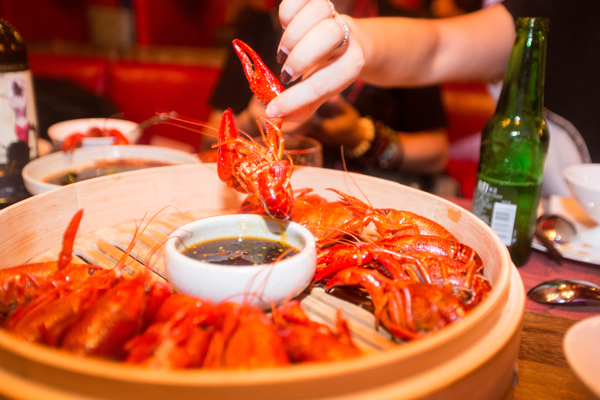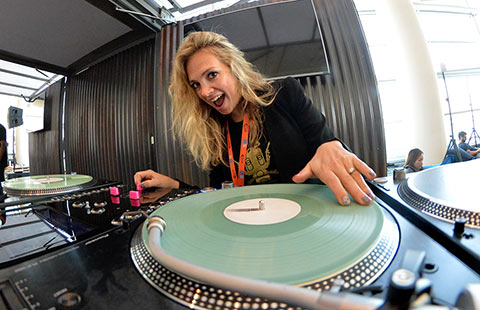Ode to crayfish as a cure for smartphone addicts
By Bai Ping (China Daily) Updated: 2016-08-18 07:45
 |
|
A diner enjoys a popular dish of crayfish, with spicy sauce and seasoning, at a restaurant in Hangzhou, capital of eastern China's Zhejiang province. Xu Kangping / For China Daily |
I used to cringe at the sight of people pulling apart crayfish, a popular summer dish for Chinese urban residents.
They suck, pinch and peel the crustacean to access the tiny part of the body that is edible. Then with red, hot sauces around their mouths, they lick their orange fingers and gulp down a beer before attacking the next "little lobster", so called for its resemblance to its noble cousin.
Recently, I had my first taste of the dish while on a work assignment in a river town in Hubei province, known as the capital of crayfish. When I asked for a standard portion, I was shocked to be served 2 kilograms of crayfish boiled with spicy and numbing seasoning ingredients, all for less than 120 yuan ($18).
Some may want to avoid the food as being messy and unhealthy. But many more are crazy about the dish, because it's cheap, tasty and, curiously, it also improves diners' table manners by keeping them away from their cell phones, at least during the meal.
One friend put it more simply: "With their fingers dripping red oil, who will touch their cell phone?"
In a country where almost every urban resident owns a cell phone, it's common to find people who cannot take their eyes off their screen everywhere, which inspires the Chinese term di tou zu, meaning people who lower their heads, or cell phone addicts.
At a restaurant, diners often ask for a Wi-Fi password before they look at a menu. Young couples can be seen tapping their smartphones with one hand and shoveling food with the other. When food is served, cell phone-wielding patrons take photos of entrees and selfies before they lift their chopsticks.
The phenomenon is not just limited to eating out. In my home, my wife and I have repeatedly renewed our pledge not to pull out and check our cell phones at the dinner table, whether for messages from the office or friends. But we've found it difficult to ignore that ring or beep, while being fully aware that we could risk neglecting each other and our children.
Mobile phone addiction has also become a headache for restaurant owners who cater to younger patrons, as they complain about slower table turnover rates and longer working hours for staff.
One restaurant in downtown Beijing has taken things into its own hands by offering 50 percent discounts every Monday for diners who will leave their cell phones in metal boxes printed with the slogan "Lock up your phones, focus on food".
The weekly offer has doubled the number of its patrons on the day, wooing gourmets who come for cheaper food. But its impact on the awareness of erosion of tech seems to be minimal. One patron said in an online review that he used his cell phone three hours on end after the meal at the restaurant.
Observers worry that the trends, if not curbed, could hurt the social functions of the Chinese eating culture that plays an important role in people befriending one another.
Earlier research results show that almost half of Chinese city residents consider dining out the most common social activity, followed by sports and karaoke singing. Close friends or colleagues like to visit crowded, noisy and jovial restaurants as good places for bonding. But, cell phones could destroy the atmosphere for socializing.
With such thoughts, I've begun to have a new opinion about the crayfish craze. It's heart-warming to see diners joke, laugh and talk, face-to-face, around piles of crayfish on the table, and with their cell phones put away.
This year, tens of thousands of crayfish restaurants have cropped up in major Chinese cities, with the country becoming the world's largest producer of the crustaceans, accounting for more than 70 percent of the total global annual output, even though they are originally from North America.
The question is, however, what could be the next Chinese social food sans a cell phone when crayfish is out of season in a couple of months?
- Crew members of bullet trains in E China prepare for G20 Summit
- India's Hike wins Tencent backing for $1.4b valuation
- China's Huawei opens Southern Pacific OpenLab in Singapore
- Tencent reports strong second quarter revenue growth
- Chinese-made helicopters fly into the sky
- Asset custody work done by banks soars
- Mondelez to invest $100m in China
- China, Philippines push enhanced trade


















